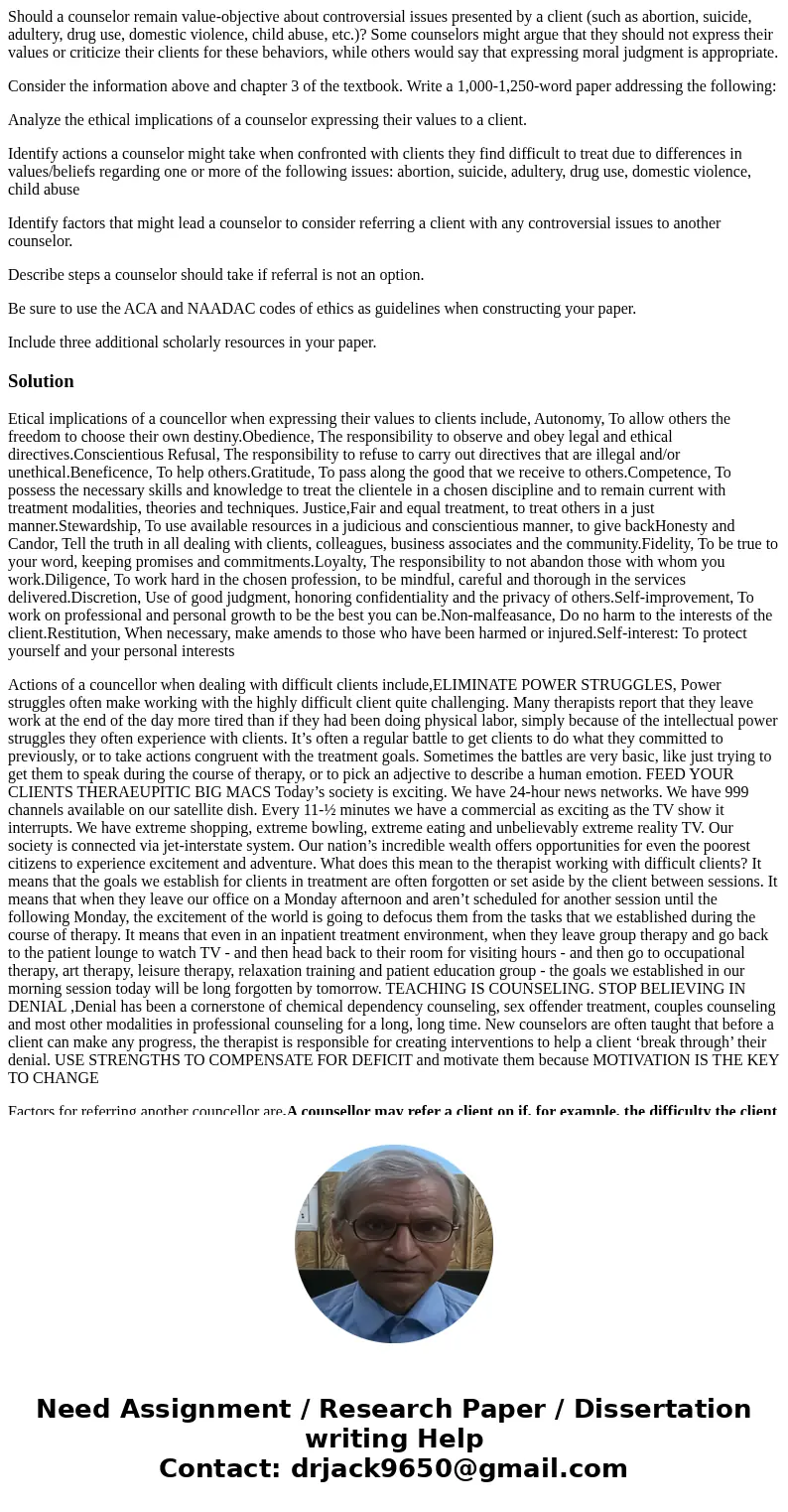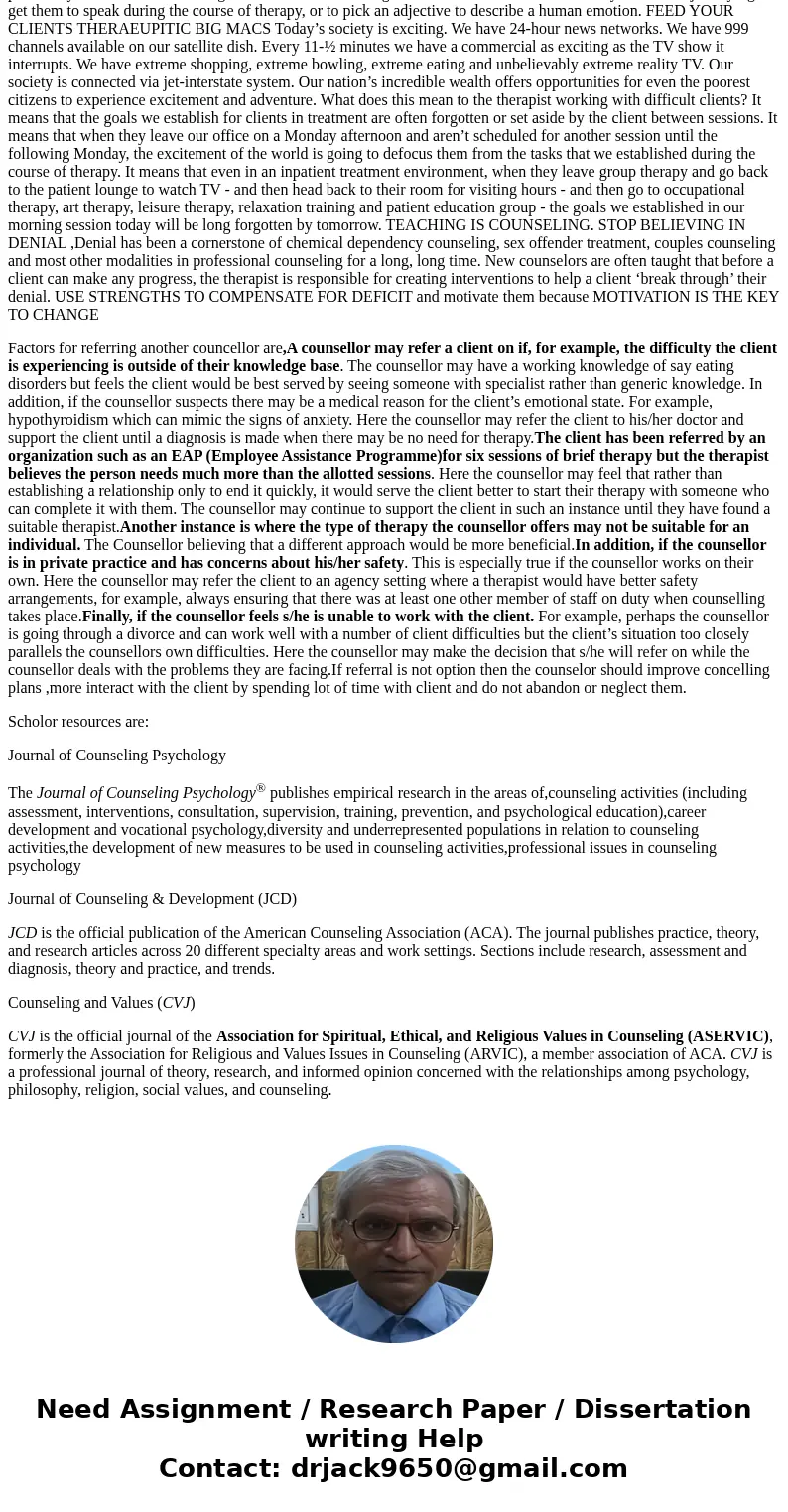Should a counselor remain valueobjective about controversial
Should a counselor remain value-objective about controversial issues presented by a client (such as abortion, suicide, adultery, drug use, domestic violence, child abuse, etc.)? Some counselors might argue that they should not express their values or criticize their clients for these behaviors, while others would say that expressing moral judgment is appropriate.
Consider the information above and chapter 3 of the textbook. Write a 1,000-1,250-word paper addressing the following:
Analyze the ethical implications of a counselor expressing their values to a client.
Identify actions a counselor might take when confronted with clients they find difficult to treat due to differences in values/beliefs regarding one or more of the following issues: abortion, suicide, adultery, drug use, domestic violence, child abuse
Identify factors that might lead a counselor to consider referring a client with any controversial issues to another counselor.
Describe steps a counselor should take if referral is not an option.
Be sure to use the ACA and NAADAC codes of ethics as guidelines when constructing your paper.
Include three additional scholarly resources in your paper.
Solution
Etical implications of a councellor when expressing their values to clients include, Autonomy, To allow others the freedom to choose their own destiny.Obedience, The responsibility to observe and obey legal and ethical directives.Conscientious Refusal, The responsibility to refuse to carry out directives that are illegal and/or unethical.Beneficence, To help others.Gratitude, To pass along the good that we receive to others.Competence, To possess the necessary skills and knowledge to treat the clientele in a chosen discipline and to remain current with treatment modalities, theories and techniques. Justice,Fair and equal treatment, to treat others in a just manner.Stewardship, To use available resources in a judicious and conscientious manner, to give backHonesty and Candor, Tell the truth in all dealing with clients, colleagues, business associates and the community.Fidelity, To be true to your word, keeping promises and commitments.Loyalty, The responsibility to not abandon those with whom you work.Diligence, To work hard in the chosen profession, to be mindful, careful and thorough in the services delivered.Discretion, Use of good judgment, honoring confidentiality and the privacy of others.Self-improvement, To work on professional and personal growth to be the best you can be.Non-malfeasance, Do no harm to the interests of the client.Restitution, When necessary, make amends to those who have been harmed or injured.Self-interest: To protect yourself and your personal interests
Actions of a councellor when dealing with difficult clients include,ELIMINATE POWER STRUGGLES, Power struggles often make working with the highly difficult client quite challenging. Many therapists report that they leave work at the end of the day more tired than if they had been doing physical labor, simply because of the intellectual power struggles they often experience with clients. It’s often a regular battle to get clients to do what they committed to previously, or to take actions congruent with the treatment goals. Sometimes the battles are very basic, like just trying to get them to speak during the course of therapy, or to pick an adjective to describe a human emotion. FEED YOUR CLIENTS THERAEUPITIC BIG MACS Today’s society is exciting. We have 24-hour news networks. We have 999 channels available on our satellite dish. Every 11-½ minutes we have a commercial as exciting as the TV show it interrupts. We have extreme shopping, extreme bowling, extreme eating and unbelievably extreme reality TV. Our society is connected via jet-interstate system. Our nation’s incredible wealth offers opportunities for even the poorest citizens to experience excitement and adventure. What does this mean to the therapist working with difficult clients? It means that the goals we establish for clients in treatment are often forgotten or set aside by the client between sessions. It means that when they leave our office on a Monday afternoon and aren’t scheduled for another session until the following Monday, the excitement of the world is going to defocus them from the tasks that we established during the course of therapy. It means that even in an inpatient treatment environment, when they leave group therapy and go back to the patient lounge to watch TV - and then head back to their room for visiting hours - and then go to occupational therapy, art therapy, leisure therapy, relaxation training and patient education group - the goals we established in our morning session today will be long forgotten by tomorrow. TEACHING IS COUNSELING. STOP BELIEVING IN DENIAL ,Denial has been a cornerstone of chemical dependency counseling, sex offender treatment, couples counseling and most other modalities in professional counseling for a long, long time. New counselors are often taught that before a client can make any progress, the therapist is responsible for creating interventions to help a client ‘break through’ their denial. USE STRENGTHS TO COMPENSATE FOR DEFICIT and motivate them because MOTIVATION IS THE KEY TO CHANGE
Factors for referring another councellor are,A counsellor may refer a client on if, for example, the difficulty the client is experiencing is outside of their knowledge base. The counsellor may have a working knowledge of say eating disorders but feels the client would be best served by seeing someone with specialist rather than generic knowledge. In addition, if the counsellor suspects there may be a medical reason for the client’s emotional state. For example, hypothyroidism which can mimic the signs of anxiety. Here the counsellor may refer the client to his/her doctor and support the client until a diagnosis is made when there may be no need for therapy.The client has been referred by an organization such as an EAP (Employee Assistance Programme)for six sessions of brief therapy but the therapist believes the person needs much more than the allotted sessions. Here the counsellor may feel that rather than establishing a relationship only to end it quickly, it would serve the client better to start their therapy with someone who can complete it with them. The counsellor may continue to support the client in such an instance until they have found a suitable therapist.Another instance is where the type of therapy the counsellor offers may not be suitable for an individual. The Counsellor believing that a different approach would be more beneficial.In addition, if the counsellor is in private practice and has concerns about his/her safety. This is especially true if the counsellor works on their own. Here the counsellor may refer the client to an agency setting where a therapist would have better safety arrangements, for example, always ensuring that there was at least one other member of staff on duty when counselling takes place.Finally, if the counsellor feels s/he is unable to work with the client. For example, perhaps the counsellor is going through a divorce and can work well with a number of client difficulties but the client’s situation too closely parallels the counsellors own difficulties. Here the counsellor may make the decision that s/he will refer on while the counsellor deals with the problems they are facing.If referral is not option then the counselor should improve concelling plans ,more interact with the client by spending lot of time with client and do not abandon or neglect them.
Scholor resources are:
Journal of Counseling Psychology
The Journal of Counseling Psychology® publishes empirical research in the areas of,counseling activities (including assessment, interventions, consultation, supervision, training, prevention, and psychological education),career development and vocational psychology,diversity and underrepresented populations in relation to counseling activities,the development of new measures to be used in counseling activities,professional issues in counseling psychology
Journal of Counseling & Development (JCD)
JCD is the official publication of the American Counseling Association (ACA). The journal publishes practice, theory, and research articles across 20 different specialty areas and work settings. Sections include research, assessment and diagnosis, theory and practice, and trends.
Counseling and Values (CVJ)
CVJ is the official journal of the Association for Spiritual, Ethical, and Religious Values in Counseling (ASERVIC), formerly the Association for Religious and Values Issues in Counseling (ARVIC), a member association of ACA. CVJ is a professional journal of theory, research, and informed opinion concerned with the relationships among psychology, philosophy, religion, social values, and counseling.


 Homework Sourse
Homework Sourse